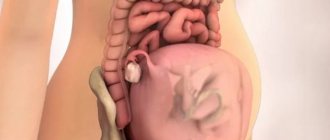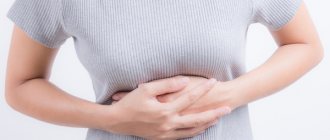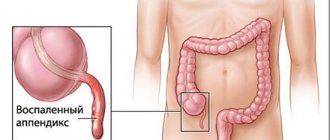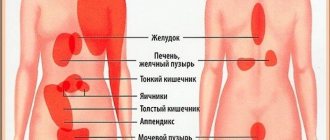How the intestines hurt during pregnancy - symptoms of the disease
When an expectant mother has a stomach ache in the intestinal area, you need to find out exactly what sensations the woman is experiencing. Thanks to a detailed analysis, the main signs of certain pathologies associated with the stomach are revealed. Perhaps the cause of discomfort is excessive gas formation in the stomach or changes in hormonal levels.
When experiencing colic in the stomach, you need to pay attention to the following nuances:
- Nature of the discomfort: spasms or pain.
- Severity: mild, moderate or acute colic.
- Location of the lesion: around the navel, in the hypochondrium, lower abdomen, in the side.
- Frequency: sharp short stabbing feelings or constant.
- Duration: Short and sharp or long lasting.
To understand why a pregnant woman’s stomach hurts, you need to study both external and internal manifestations. It is important to determine what exactly causes the pain and how to get rid of the discomfort without harming the child.
Colic in pregnant women can be caused by the following reasons:
Physiological aspect
During pregnancy, both in the early and late stages, hormonal changes occur in the body. The level of estrogen and progesterone increases, because of this the muscles of the internal organs relax and cause slight discomfort.
Incoming food begins to be absorbed worse; due to the stress state in the woman’s body, the muscles of the organs contract, this causes cramps and cramps in the abdomen, either on the right, then on the left, or in the epigastrium. The stomach will stop hurting after hormonal levels normalize. In this case, it is better to consult a gynecologist and take a vitamin complex for pregnant women.
Miscarriage
Aching, pulling sensations with muscle spasms may indicate premature birth or miscarriage. What exactly happens in the body depends on the trimester.
During premature birth, a girl experiences the following symptoms:
- bleeding from the vagina;
- aching pain radiating to the lower back;
- a sharp increase in uterine tone;
- slow dilatation of the cervix.
If these symptoms are not treated promptly, a miscarriage may occur. If pregnancy is terminated, fragments of the fetus or placenta may remain in the uterus, which increases the risk of thrombohemorrhagic pathologies and infection of the mother. Therefore, if you have nagging pain in the lower abdomen, you should contact your doctor and undergo an examination in order to protect your health and the fetus.
Placental complications
In case of injury, toxicosis or viral diseases, parts of the placenta may move away from the uterus. The child begins to be in danger, as the blood supply and supply of nutrients are disrupted. A woman develops the following symptoms:
- Acute pain in the uterine area.
- Internal bleeding opens (can be either weak or pronounced).
- The condition of the fetus is disturbed.
If the placenta begins to exfoliate in the center, then there will be no external bleeding, since the blood discharge penetrates the walls of the uterus. Such abnormalities usually occur in the initial stages of pregnancy. If treatment is not started, the pathology will progress and the fetus will die in the womb in the first weeks of development.
Intestinal diseases
If you have pain in the stomach area, the organ itself may be bothering you. This is associated with inflammatory or infectious pathologies. In addition, poor nutrition in pregnant women often disrupts the functioning of the digestive tract, which is characterized by colic in the abdominal cavity. If the expectant mother had gastritis or an ulcer before pregnancy, this can also cause the development of the disease.
Chronic inflammation is observed only in the presence of colitis or Corn's disease. Infectious lesions appear due to the ingestion of viruses and E. coli.
Problems with the organ make themselves felt by the following symptoms:
- stitching pain in the navel and sides;
- rumbling and cramping in the stomach;
- diarrhea;
- discharge of mucus, blood or bile formations along with excrement.
If the intestinal mucosa is irritated, the stool will be normal without additional discharge, and discomfort does not appear at night. With infectious lesions, girls develop a fever and diarrhea.
Inflammatory processes
Pain syndrome in the lower abdominal cavity most often indicates inflammatory processes in the female genital organs.
In this case, the following symptoms appear:
- drawing dull unpleasant sensations in the sacral area radiating to the rectum;
- a sharp increase in temperature.
- painful feelings when examined by a gynecologist and during palpation of the abdominal cavity.
Acute manifestations in the abdominal cavity may indicate peritonitis, a dangerous inflammation of the peritoneum. Therefore, at the first signs of ill health, treatment must be started immediately to avoid complications.
Urinary tract disease
A pregnant woman's stomach often hurts due to problems with the genitourinary system. Pronounced spasms appear in urolithiasis. In this case, discomfort and pain are transmitted to the genitals. If there is severe pain at the bottom during pregnancy, this indicates the development of cystitis.
As the pathology develops, the following signs will appear:
- cloudy urine (particles or blood may appear);
- constant desire to go to the restroom;
- pain when urinating.
Most often, pain in the abdominal cavity indicates pathological abnormalities in the functioning of the genitourinary system. Therefore, first you need to undergo a full examination and identify any deviations from the norm.
Pain during late pregnancy – is it worth sounding the alarm?
Pregnancy usually begins in a healthy body.
In rare cases, it happens that conception occurs against the background of exacerbation of chronic diseases or other pathological conditions. But since pregnancy lasts a long time, not a single healthy woman is immune from health problems during this period. They often begin due to a heavy load on the work of internal organs during gestation. The first half of pregnancy proceeds calmly because the baby is still small. But as the child grows, the likelihood of pain during pregnancy in later stages increases. Therefore, every woman should know in what situations she should consult a doctor.
Obstetric causes of pain
Some pregnant women do not even imagine what the threat of miscarriage is. Other women, on the contrary, from the very beginning of pregnancy are haunted by the idea that a spontaneous abortion or premature birth may begin. In such situations, you must always be on your guard and if you experience any nagging or intense pain in the lower abdomen, you should immediately consult a doctor.
Premature birth is rare, and there are usually predisposing factors: chronic maternal diseases, hormonal deficiency, fetal diseases.
Premature labor begins with mild pain in the lumbar region, which is gradually joined by contractions. Contractions of the uterus are rhythmic and gradually increase in intensity.
In this case, the uterine os expands and the cervix smoothes. If you consult a doctor in time, labor can be stopped.
Another dangerous condition that causes pain in late pregnancy is placental abruption. It can begin at any time and always requires immediate treatment.
During placental abruption, the child may be left without nutrition and die, so if bleeding from the genital tract and pain in the lower abdomen occurs, you should immediately call an ambulance.
Most often, detachment is preceded by stress, injury or health problems.
Braxton Hicks contractions are also a cause of pain in late pregnancy. But they are safe, since they never lead to the development of real labor.
Such contractions are non-rhythmic (that is, they occur at different intervals) and not intense.
Typically, the frequency of training contractions increases before childbirth, as with their help the uterus prepares for this process.
Non-obstetric reasons
In the second half of pregnancy, a woman faces many unexpected problems. But some of them are inevitable, as they appear due to restructuring of the woman’s body.
For example, constipation, which occurs due to the action of progesterone and the pressure of the growing uterus on the intestines. The result is abdominal pain and flatulence. Often there is an unpleasant burning sensation behind the sternum - heartburn.
Its cause is the pressure of the uterus on the stomach and insufficiency of the upper sphincter.
Many women experience heaviness in their legs, which is associated with fatigue and varicose veins. Typically, such pain in late pregnancy goes away after resting in a horizontal position, but they also cannot be ignored. Many pregnant women also experience joint pain.
They arise for various reasons. If your knees or pelvis hurt, this is due to the weight gain of the pregnant woman. If the small joints of the hands or feet swell, the cause is immunological.
The cause of such problems is progesterone, which softens the ligaments of the joints and they cease to fully perform their function.
The enlarged uterus puts pressure not only on the internal organs, but also on the anterior abdominal wall. As a result, women may experience separation of the rectus abdominis muscles, which is accompanied by nagging pain and discomfort. It is impossible to cure this condition, but to prevent it, all pregnant women are recommended to wear a bandage.
Since the center of gravity shifts due to a large uterus, many pregnant women begin to experience problems with the lower back.
Wearing shoes with low heels, using a bandage and regular exercise will help reduce pain during late pregnancy. If the ligaments relax too much, the manifestations can be extremely serious.
Some women have back problems for the rest of their lives, so you need to immediately think about how to avoid such troubles.
Another common cause of pain during pregnancy is symphysitis. This condition is characterized by separation and inflammation of the pubic symphysis. During examination, a woman complains of pain in the perineum.
It also becomes difficult to walk and climb stairs, and to straighten up from a lying position on your own. True symphysitis is rare. Typically, nagging pain during pregnancy is associated more with relaxation and stretching of the pelvic muscles.
This process is necessary as it facilitates the process of giving birth to a child.
Also, no woman during pregnancy is immune from exacerbation of cholecystitis or the occurrence of appendicitis. These diseases require immediate assistance, so if intense pain appears in any part of the abdomen, it is best to immediately call an ambulance. Timely treatment will help the child recover without complications.
Another serious condition is renal colic. If a woman has had kidney stones or chronic pyelonephritis, the condition may worsen during pregnancy.
To prevent this, you need to actively engage in prevention (special exercises, a normal diet, diuretic herbs and regular monitoring of urine tests).
Ultrasound diagnostics of the kidneys allows changes to be detected in time, so if there is any suspicion, you should undergo this safe examination.
What to do if you have pain?
Pain should never be ignored, especially when it comes to a pregnant woman. With the help of pain, the body shows that there are some problems in the body and they need to be corrected.
Only a doctor will be able to differentiate the cause of pain and make an appropriate decision.
Therefore, a woman should not take responsibility for her condition and for the life of the child, and if any pain occurs, she should contact a gynecologist.
If there are any prerequisites or predisposition to diseases, then from the beginning of pregnancy it is necessary to take all possible preventive measures. This will help avoid serious pregnancy complications. You should also follow all your doctor's recommendations because this will help protect your health and prevent many common problems during pregnancy.
Source: https://www.mymummy.ru/pregnancy/boli-pri-beremennosti-na-pozdnikh-srokakh.html
What causes colic - possible causes of the disease
During pregnancy, colic occurs for many reasons.
The main ones include:
- Colic sometimes occurs before the expectant mother finds out about her interesting situation. In the first trimester, the embryo begins to develop and enters the center of the uterus, where it implants into the uterine walls. These actions cause slight tingling and discomfort in the lower abdomen. Sometimes there is a slight discharge of blood from the vagina. Unpleasant sensations are similar to pain before menstruation, so most often they do not cause concern in women.
- At 1–5 weeks of gestation, hormonal changes occur in the body, which can cause pain and muscle spasms. There are also malfunctions in the digestive system, constipation and heaviness in the stomach.
- Eating large amounts of heavy food and not following a diet. Eating before bed, fatty foods, and processed foods increase gas formation in the stomach. Because of this, the functioning of the organ is disrupted and colic occurs.
- In the 3rd trimester, the walls of the uterus expand, which provokes a shift in the internal organs. The enlarged uterus puts pressure on the intestines, its function worsens, constipation and bloating appear. You can remove unpleasant feelings by changing the position so that the organs stop pressing on each other.
- Stress, overexertion, poor sleep have a bad impact on the health of the expectant mother. The functionality of the organ deteriorates, leading to bloating and colic.
- If the digestive system is poorly functioning before pregnancy, this problem intensifies during gestation. During constipation, stool hardens inside the body, and when excreted, the expectant mother feels pain and discomfort. Gas formation increases, bloating and stabbing sensations become more frequent.
- Dysbacteriosis is damage to the intestinal microflora. When the number of harmful bacteria increases, organ dysfunction occurs, causing bloating.
Intestinal colic
If a woman has a painful stomach with a strong urge to defecate, she most likely has intestinal colic. The pain is concentrated below, in the area of the intestines and is similar to muscle cramps, and may be accompanied by an acute urge to go to the toilet.
Causes of intestinal colic can be:
- immediate reaction of the intestines to changes in the pregnant woman’s food preferences (either she wants cold and salty foods, or suddenly she wants sweets),
- Progesterone hormones negatively affect the intestines: it slows down motility and stagnation of food processing products occurs,
- The uterus increases in size and puts pressure on the intestines.
In order not to aggravate the predisposition to gas formation and cramping pain in the intestines during this period, expectant mothers must strictly adhere to the diet and diet - eat regularly, in small portions, and temporarily exclude pickles, smoked meats, sweets and spices from food. Walking, minor physical activity and positive emotions help the gastrointestinal tract work well. You can relieve acute pain with a warm heating pad.
Special diets or what to avoid
During the period of bearing a child, it is important to adhere to a diet and eat well. Products must contain useful elements and vitamins to strengthen the immunity of the child and mother.
During the diet you need to adhere to the following rules:
- It is necessary to drink as much liquid as possible (water, tea, natural juices, smoothies).
- Limit consumption of spicy, fried, fatty, salty and smoked foods. If the body requires these products, then it is allowed to consume them in limited quantities and no more than 2 times a week.
- Flour and sweets also need to be reduced (you can eat marshmallows, dark chocolate, marmalade in minimal quantities).
- Dishes must be cooked in the oven or steamed. You can also stew and boiled foods.
- During pregnancy, smoking, drinking and drugs are prohibited.
In addition, a woman needs to take prenatal vitamins and eat fresh vegetables and fruits. It is best to avoid citrus fruits. There should be 5-6 small meals per day. In the evening you can eat 2-3 hours before bedtime; the food should be light and quickly digestible.
How to avoid intestinal colic and not harm your baby
To avoid colic and not harm the unborn child, experts recommend that women systematically engage in abdominal exercises. To do this, you need to massage the abdominal cavity clockwise every day for 7-10 minutes. This will improve digestion and eliminate gas in the stomach.
You should also do fasting days every week to cleanse your intestines. For one day you should eat only cereals, fresh vegetables and fruits, and drink plenty of fluids.
Acupressure of the body will improve the functioning of the digestive system, remove heaviness and discomfort in the body.
Causes
Pain in the intestines in a pregnant woman can occur for the following reasons:
- Pressure of the uterus on the intestines.
- A gut disorder caused by bacteria or viruses often has pain as one of its symptoms.
- Non-infectious intestinal diseases.
- Intestinal colic also causes pain and discomfort in the intestinal area in a pregnant woman.
Such diseases and conditions often cause not only pain, but also nausea, vomiting, headaches in a pregnant woman, and sometimes this even becomes the basis for termination of pregnancy. Therefore, it is important to consult a doctor at the first signs of pathology, and not try to treat the problem yourself, since the body of a pregnant woman requires a more attentive attitude towards itself.
Pressure of the uterus on the intestines
Since the intestines are located near the uterus, and it grows larger every month, this creates pressure. The intestines are pinched, stagnation of feces and gases is formed. This leads to pain and constipation. Intestinal problems for this problem most often begin in the third trimester, but can appear already in the second, especially if a woman is carrying several babies.
When the uterus presses on the intestines, the following symptoms appear:
- pain pulling in the lower abdomen, but more often localized in the center of the abdomen;
- constipation, which can sometimes be replaced by short-term diarrhea;
- nausea and vomiting, which will be a sign of intoxication due to the accumulation of feces in the intestines;
- the appearance of a rash on the face;
- weakness and lethargy.
Intestinal disorder
It is necessary to carry out supportive therapy, drink a lot of water and saline solutions, you can use a certain range of antibiotics to fight the infection, which the doctor will prescribe to help the intestines cope. This will help get rid of the symptoms of the disease and eliminate their cause.
During an infection, “gut pain” is not the only complaint of pregnant women; women often complain of:
- flatulence;
- bloating;
- rumbling in the stomach;
- loose stools;
- repeated vomiting;
- dehydration;
- severe weakness.
The most important thing to do is consult a doctor, as unjustified use of medications can harm the fetus.
Non-infectious bowel diseases
Often pregnancy exacerbates intestinal diseases in a woman that were previously invisible.
These include:
- Crohn's disease;
- irritable bowel syndrome;
- diverticulitis;
- tumors in the intestines;
- nonspecific ulcerative colitis.
These pathologies can only be identified through a thorough medical examination. Since any of these conditions affects the body of the mother and fetus, this may be a reason to terminate the pregnancy. Doctors try to delay treatment or give the woman the most harmless drugs during pregnancy, but if there is a choice between the life of the woman or the fetus, they choose the first.
Intestinal colic
The cause of intestinal colic is initially the consumption of fatty foods and large amounts of carbonated liquid. In pregnant women, the symptoms are aggravated only because the diseased intestines are tightly pressed (located very close to the enlarged uterus) and any movement inside becomes many times stronger.
Intestinal colic manifests itself as follows:
- The stomach hurts a lot, the pain is reminiscent of labor pains;
- spasms occur on the right or left, can alternate or be simultaneous;
- stomach twists, rumbling appears;
- Nausea and vomiting may occur;
- weakness increases.
Intestinal colic often goes away without the use of medication. A pregnant woman just needs to lie down for a few minutes, relax, choose a comfortable position, and the pain will quickly go away. Due to the lying position, the position of the intestines relative to the uterus will change, and the pain can significantly decrease; you should remember a comfortable position and resort to using it every time the need arises.
One of the main causes of constipation and diarrhea is the use of various medications.
.
To improve bowel function after taking medications, you need to drink a simple remedy
.
Causes of pain and intestinal colic during pregnancy
Unpleasant tingling sensations in the intestines can bother a pregnant woman for several reasons. Let's consider what factors provoke the appearance of intestinal colic most often:
- implantation of the fertilized egg into the wall of the uterus. The implantation of an embryo into the tissue of the reproductive organ is usually accompanied by some discomfort and slight tingling in the lower abdomen. Based on these symptoms, pregnancy can be suspected even before a rapid test is performed. Most often, women mistake these sensations for the approach of menstruation;
- hormonal surge. Spasms and tingling in the intestinal area can be caused by hormonal imbalance in the body of a pregnant woman. This usually occurs 1-5 weeks after conception;
- overeating and imbalanced diet. With the onset of pregnancy, a woman feels hungry more often than usual, so she can afford to eat too much. Fatty, sour or spicy foods, processed foods, late dinners lead to the development of flatulence, so the intestines “suffer”;
- in the late stages of pregnancy, the intestines usually hurt due to too close proximity to the uterus, which has grown several times since conception. The large organ puts pressure on the intestines, which invariably leads to disruption of its functionality and provokes bloating and constipation. Usually the pain goes away quickly if the expectant mother changes her position so that the pressure of the uterus on the intestines weakens;
- If before pregnancy a woman often suffered from dysbiosis, there is a high probability that she will encounter the same problem while already pregnant. Violation of the intestinal microflora causes bloating and pain in the organ.
What can be confused with pain in the intestines?
Since the intestines are quite a large organ, and in a pregnant woman, as the pregnancy increases, all the organs move from their usual places, you can easily confuse pain in the intestines with another pain.
After all, the organs of the genitourinary system are located nearby, which also often bother a pregnant woman (at least take the eternally full bladder - this is how it always seems to pregnant women; due to the pressure of the uterus on it, the urge to go to the toilet is frequent, and sometimes pain can occur).
Pain can also be caused by other problems not related to the intestines. In this case, it would be appropriate to contact not a gastroenterologist, but a gynecologist to solve these problems.
The causes of pain may be the following:
- Sprained ligaments that support the uterus often cause pain in a pregnant woman in the last trimester. After all, the fruit is already large and it is quite difficult to maintain such weight. Women often feel a pull in their lower abdomen, and they can’t do anything about it. The best help is rest to give the ligaments enough rest to sit or lie down.
- Problems may also arise with bearing a fetus. Here the woman will feel pain that radiates to the tailbone and lower back, will notice discharge with blood from the vagina, and will also feel increased tone of the uterus.
- Detachment of the placenta from the uterus. It is easy to understand whether the uterus or intestines hurt, since in the first case there will be characteristic symptoms - sharp pain in the abdomen and bleeding from the uterus. You need to seek help from a doctor immediately, as this can cost the life of both the fetus and the woman.
- Inflammation of the organs of the reproductive system causes a woman to experience pain in the lower abdomen, sharp or nagging, depending on where the source of inflammation is located; the kidney area, the rectum, and the right or left side of the abdomen can become susceptible to pain. Inflammation can also spread to the intestines (appendicitis is often noted).
- Diseases of the urinary system often present with pain at the very beginning. Cystitis, urethritis, pyelonephritis are often accompanied by pain and stinging when urinating, burning, frequent urge to go to the toilet, and pain in the lower abdomen. During pregnancy, a woman should be careful about her health, since these diseases, as well as sexually transmitted diseases, can negatively affect the development of the fetus.
What to do when your intestines hurt during pregnancy
Elimination of any ailment is always preceded by a detailed examination by a doctor. If the stomach and intestines hurt, the expectant mother should first consult a gastroenterologist. The specialist will determine the cause of the ailment and choose a safe and at the same time effective treatment tactics.
To relieve a pregnant woman from pain in the intestines, the following medications are usually prescribed:
- No-shpa (Drotaverine) - to eliminate spasms and relieve pain;
- Espumisan - to eliminate bloating and normalize gastrointestinal motility;
- antibacterial drugs;
- probiotics.
Treatment
Treatment of pain in the intestines should be carried out under the supervision of a gastroenterologist, as well as in consultation with a gynecologist. Since many medications cannot be taken by pregnant women, you should not buy or drink them yourself.
The doctor may prescribe painkillers (No-shpu), drugs that will remove gases (Espumizan), antibiotics to influence pathogenic microorganisms, probiotics to restore intestinal microflora, mild laxatives to eliminate constipation (Duphalac), hormones to restore hormonal balance and other drugs.
But they need to be taken only in the dosage prescribed by the doctor; if the medicine does not work, it is better to consult a doctor again, rather than independently increase the dose and frequency of administration, as this can cause complications for the woman and child.
You will have to give up exotic dishes, coffee, alcohol, and soda too. You should also forget about fatty, spicy, heavy foods. But fruits and vegetables, cereals, and fermented milk products should be consumed as much as possible, this will help with intestinal function and allow a woman to feel full and healthy.
Lack of fluid in the diet is one of the main causes of constipation. To get rid of it in 3 days, you need to drink a simple remedy every day.
It is quite easy to confuse a diseased intestine with pain caused by pathology of other organs. Therefore, self-medicating without identifying the cause of the symptom can harm both your body and your baby. It is best to entrust your health to a specialist in order to protect both yourself and your child from unpleasant consequences.
There are probably no more amazing and vivid feelings in the world for a woman than those she experiences while expecting a baby. An extravaganza of emotions arises from the very first moment, when she only holds the treasured test with a trembling hand and accompanies her right up to the birth.
The word extravaganza is used here for a reason, because emotions are not always rosy - in addition to happiness that a woman will become a mother, there is often fear, worry and anxiety - what if something goes wrong? Any uncomfortable sensations in the stomach frighten the expectant mother to horror, but often they are caused by problems with the intestines.
Why does my intestines hurt during pregnancy?
Cramping pain in the abdomen during pregnancy, in most cases, indicates that the intestines hurt. This problem becomes more pronounced, because the first thought that comes to a woman’s mind is that maybe the pregnancy is going wrong? This, in turn, leads to additional stress on an already fragile nervous system. Is it worth it to be so nervous? We need to figure it out.
Due to bloating of the large intestine and, as a result, strong muscle tension, spasmodic pain occurs in the abdomen, which I call colic. As a rule, this happens due to poor nutrition, as a result of which a fermentation process can occur in the body, as well as due to various diseases of the digestive system.
In pregnant women, intestinal colic can also be caused by another process - the migration of an egg into the uterine cavity. A characteristic feature of this process is that the intestines hurt during early pregnancy - literally a few days after conception occurred. That is, a woman at that time may not even suspect that she will have a child. In addition, hormonal changes may also be to blame for everything that is happening, because from this moment all the most important events will develop here, the work of the whole organism will be aimed at the future person.
The rapid development of the fetus and its constant growth leads to the fact that the lower abdomen begins to prick more and more often. In addition, this can often lead to bleeding. If colic accompanies a woman constantly and is accompanied by hemorrhage, she should urgently seek the help of a specialist.
In some cases, this problem may even require hospital treatment. Indications for this are incessant spasms, constant problems with stool, pulling sensations in the abdomen, which can accompany a woman for days.
Irritable bowel syndrome
This functional disorder of the intestines most often manifests itself during pregnancy. The main causes of pain and problems with stool are:
- unhealthy diet – abuse of fatty, fried foods, fast food;
- lack of fiber in the daily diet;
- regular overeating;
- diseases of the digestive system;
- constant stress and anxiety;
- genetic predisposition;
- disruptions in the hormonal system.
The following symptoms are typical for irritable bowel syndrome:
- pain that goes away after passing gas or having a bowel movement;
- change in stool color and consistency;
- constant alternation of diarrhea with constipation;
- bloating;
- rumbling;
- discomfort in the rectal area;
- frequent desire to have a bowel movement.
In addition to functional disorders, the syndrome is accompanied by general symptoms, for example, weakness, fatigue, insomnia, heart rhythm disturbances, migraines, and discomfort during sexual intercourse. In the case when a pregnant woman experiences weight loss, development of anemia, swelling in the abdomen, hardening of the anus and the release of blood clots from the anus, she should undergo a full examination and select effective therapy.
The following tests are used to diagnose irritable bowel syndrome:
- coprogram of feces;
- blood test (general and for celiac disease);
- colonoscopy;
- CT scan.
The examination is carried out as prescribed by the doctor, after passing general tests, interviewing the patient and finding out the possible causes of pain and bowel movements in the pregnant woman.
Basic methods for diagnosing intestinal problems in pregnant women
Intestinal colic during pregnancy has a number of signs that cannot be confused with anything, which greatly facilitates the correct diagnosis:
- spasmodic pain that periodically occurs in the intestines;
- sensations of bloating, seething, rumbling, distension and heaviness;
- heartburn, which is accompanied by an unpleasant odor;
- too frequent, or, conversely, rare stools;
- there are mucus tubes and ribbons in the stool;
- attacks of nausea and vomiting;
- there is practically no appetite, or food is disgusting.
As a rule, all these symptoms intensify with any emotional shock, while eating (especially if the food is heavy and fatty), and also if a woman leads a sedentary lifestyle.
The greatest likelihood of becoming hostage to intestinal colic occurs in those expectant mothers who are often nervous, in a state of anxiety or depression - for them this is the most favorable environment.
It should be taken into account that intestinal colic is not a problem in the early stages; many women, even when they are already 38 weeks pregnant, have intestinal pain. This is due to the fact that an already grown and moving child touches internal organs, including the intestines, with every movement. As a result of this, the appearance of microcracks is not uncommon.
If the cause of spasms is an allergic reaction, a diagnosis will be possible only after a stool analysis. Then it may contain eosinophils and pointed crystals, which are also present in asthmatics. Physically, colic can be “felt” when examining the abdomen - enlarged intestines are usually visible on the body.
High temperature is not observed in women suffering from intestinal disease.
Basic treatment methods and preventive measures
Many women come to the doctor with the question: intestines hurt during pregnancy, what to do? There can only be one answer - treat, and do everything possible to prevent recurrence. In most cases, treatment can be done at home, however, it is better to consult a specialist regarding treatment methods.
Wrong actions can not only not help, but also aggravate the condition. For example, the well-known method of applying a warm heating pad to the lower abdomen during cramps can intensify colic if the intestines are swollen too much at that moment.
What you definitely need to do is control your diet.
No fried, spicy, rich or anything that contains gases. It is worth increasing the amount of vegetables in your menu that do not cause gas (potatoes, legumes) and introducing fiber into your diet. It is thanks to fiber that everything that has accumulated in the intestines softens and is easier to excrete. You should introduce into your diet porridge with bran, those types of bread that produce their grains. But you also don’t need to get too carried away with fiber, since excess fiber can lead to flatulence and bloating. It’s better to master the steamer and completely give up fried foods.
Today on the market there is a large selection of all kinds of food additives that help improve the functioning of the stomach and are not contraindicated for pregnant women. If we are talking about pain mainly in the lower abdomen, then you should pay attention to products containing pectin - oranges, grapefruits, papaya.
Water should be on the table at all times. During the day you need to drink at least eight glasses of clean drinking water; it facilitates easy processing of food. It is worth eliminating caffeine from your menu. We are talking not only about coffee, but also tea drinks, Coca-Cola, and chocolate products. It is better to avoid milk and dairy products when cooking.
What to do if your stomach hurts during pregnancy
At the first appearance of abdominal pain, you need to perform the following simple measures:
- Abdominal pain at any stage of pregnancy causes anxiety and irritability. The first thing you need to do is calm down and normalize your emotions;
- contact your doctor or call an ambulance. Sometimes a telephone consultation helps to recognize the cause of discomfort;
- If other symptoms appear (diarrhea, constipation, etc.), pay attention to the duration of this condition. If the duration of diarrhea is more than 3 days and is accompanied by hyperthermia and vomiting, then emergency hospitalization is necessary (most likely it is an intestinal infection). In other cases, we are talking about physiological changes during pregnancy.
Any stress and overexertion can provoke abdominal pain of any intensity. In order not to aggravate the current situation, you should try to relax and calm down as soon as possible.
What are intestinal pains?
It would seem that pain is pain, however, intestinal pain can be different, and the cause and method of treatment depend on what particular case the woman is faced with.
Cramps in the intestines
With spasms, the pain changes with a change in posture, with every movement, and even with sneezing. As a rule, after visiting the toilet there is a temporary improvement in the condition. In this case, the painful sensations are associated with excessive gas accumulations, as well as with the problem of inconsistent stool.
With pain in the lower part, we can talk about more serious problems - diseases of the intestines or abdominal cavity. This could be appendicitis, ulcers, liver or kidneys, hernia, as well as various inflammatory processes occurring in the body. In addition, in women it is fraught with inflammation of the reproductive system.
Another type of pain, which usually radiates in the lower abdomen, can signal intestinal obstruction and even volvulus. In men, such pain is accompanied by painful urination and indicates a problem associated with prostate function.
At a time when a woman carries a baby under her heart, her stomach becomes an object of special attention. As soon as she senses any deviations from the norm, she immediately sounds the alarm. And here, the main thing is not to panic, but to visit a doctor in a timely manner in order to understand whether these are just spasms or something serious.
If we are talking about abdominal pain in a pregnant woman, then it can be classified as obstetric or non-obstetric
- when there is a threat of interruption;
- ectopic pregnancy;
- placental abruption.
Non-obstetric pain:
- problem with the digestive tract;
- sprain of abdominal ligaments and muscles;
- various surgical pathologies.
If we are talking about the risk of losing a child, a woman feels a characteristic nagging or constantly aching pain in the lower back and lower abdomen. There may even be a discharge mixed with blood.
An ectopic pregnancy is characterized by sharp pain, sometimes going away, sometimes appearing with renewed vigor. The pain can be so severe that a woman can even lose consciousness. However, it also happens that there is practically no pain, and bleeding is barely noticeable. Then the woman may not be aware of her problem for a long time. The fallopian tubes usually rupture between eight and twelve weeks.
If premature placental abruption occurs, sharp pain inside the abdomen may appear, internal bleeding and even hypoxia may occur. The body of a pregnant woman goes through difficult trials. Hormones are raging, the body is being rebuilt literally brick by brick. Constipation, dysbacteriosis, flatulence, vomiting - you name it, and most of this is considered within the acceptable norm. The child grows in the mother’s womb day by day, as a result of which it inevitably affects all the internal organs of the mother, causing discomfort and even pain. It is during this period that many chronic diseases worsen, from problems with stool to appendicitis.
The body of a pregnant woman goes through difficult trials. Hormones are raging, the body is being rebuilt literally brick by brick. Constipation, dysbacteriosis, flatulence, vomiting - you name it, and most of this is considered within the acceptable norm. The child grows in the mother’s womb day by day, as a result of which it inevitably affects all the internal organs of the mother, causing discomfort and even pain. It is during this period that many chronic diseases worsen, from problems with stool to appendicitis.
You should know that, no matter where and how the stomach hurts, until the exact cause of what is happening is established, in no case should you resort to any physical influence. Even a simple harmless massage can lead to internal bleeding.
It happens that the stomach hurts simply because a woman has eaten too much and any pressure on it can provoke excessive formation of gases, as well as difficulties with digesting food. In addition, a woman may face the problem of lactose intolerance. If the problem was due to the above reasons, then after some time, all the discomfort will simply go away.
It happens that a woman does not even fully understand what and where she is hurting. Pain in one place can be felt on the completely opposite side. For example, with pneumonia, many patients complain of pain in the upper abdomen, although it would seem that there is no connection here.
Pain in the upper abdomen
Pain in this part of the abdomen, as well as in others, does not cause very pleasant sensations. But in order to get rid of them it is necessary to find the cause of what is happening. Regarding this part of the abdomen, the most common reason is that the shrinking uterus puts pressure on the liver and gallbladder. All this provokes a malfunction in the process of bile secretion.
Many expectant mothers experience discomfort due to the baby’s movements, especially if we are talking about a multiple pregnancy or a large child. As a result of the pressure on the internal organs, a woman loses her appetite, suffers from heartburn, bloating and even vomiting; this is what many call toxicosis.
Pain in the left side of the abdomen
If the cause of pain on the left side is in the intestines, then most likely this is due to problems with stool - diarrhea or constipation. Then there may be blood in the stool, and the temperature becomes higher than normal.
If the cause of pain on the left side is in the intestines, then most likely this is due to problems with stool - diarrhea or constipation. Then there may be blood in the stool, and the temperature becomes higher than normal.
The stomach can also respond on the left side after poor nutrition, drinking alcohol or taking a strong antibiotic. However, as a rule, the stomach hurts in this part not very much, but for a long time. In this case, vomiting and attacks of nausea are also possible.
In addition, a hernia may appear in this part, then the pain may spread and partially affect the chest. It should be noted that the diagnosis of “hernia” cannot be made by anyone except a specialist, and in no case should you delay in solving this problem. Therefore, at the first suspicion, you should immediately go for examination to a professional. Many diabetics, smokers and alcohol abusers suffer from pain on the left side.
Pain in the right side of the abdomen
Pain in this part of the abdomen is usually associated with the functioning of the liver, gallbladder, pancreas and duodenum. Problems with these internal organs can occur in the shoulders (biliary tract), back (duodenum or pancreas), and in men, in the ovaries (kidneys). In addition, appendicitis, right kidney and genitals may hurt here.
Based on the above, it is clear that there are enough reasons for discomfort in the intestines in pregnant women. Not all of them are associated with any serious diseases, and some do not even require special treatment. However, if we are talking about any pain that does not stop for a long time, you should definitely see a specialist. In addition, you should immediately visit a doctor if intestinal problems are accompanied by additional symptoms, such as fever, vomiting, or problems with stool. It is not recommended to use any medications or traditional methods of treatment without a doctor’s recommendation.
Right side hurts during pregnancy - reasons + how to relieve pain
During the period of bearing a child, a woman experiences many different and new sensations, including painful ones. When an expectant mother has pain on her right side during pregnancy and this pain is constant, this phenomenon cannot be ignored.
Let's figure out why pain in the side occurs, what causes such symptoms, and why seeing a doctor is necessary if the pain is constant.
What organs are located on the right side of the abdomen?
When they say “stomach hurts” or “stitches in the side,” they do not mean any one specific organ. After all, the “stomach” is a complex system of internal organs with its own tasks and functions.
What can hurt on the right side? In diagnosing the problem, it is very important to understand where exactly the pain is localized.
To do this, let’s divide the right side of the abdomen into the upper and lower halves:
- At the top are: liver, bile ducts, gallbladder, intestines, stomach and diaphragm, kidney, duodenum, pancreas;
- in the lower – ureter, fallopian tubes, appendix, ovary with appendage, small and large intestines;
Pregnancy leads to changes in the functioning of almost all organs. Their activity weakens, blood circulation is impaired, and immune status decreases. The result is an exacerbation of chronic diseases and the emergence of new problems that have never bothered a woman before.
Pain in the right side: what you need to know - causes, symptoms and nature of pain
Pain in the right side varies in nature and intensity. They can be stabbing, aching, pulling, appear under the ribs in the lower abdomen in the early stages, appear during urination or immediately after eating or between meals. Sometimes pain is provoked by sleeping on the right side, walking, physical activity, sex and other factors.
But only a specialist can determine the source and cause of painful sensations by their nature and intensity. And then after a thorough examination and diagnostic studies.
Pain in the right side can be caused by a number of serious reasons, as well as physiology.
Let's look at the most common causes of pain in the right side:
- Physiology.
The pain is short-term (up to 15 minutes), mild. As a rule, this is a consequence of the physical impact of the fetus on the organs. - Stretching of the uterus.
The pain is localized in the lower part, has a long-lasting and aching character, and intensifies when the baby moves. This pain occurs due to stretching of the uterus: the child begins to gain weight and puts pressure on the muscles. - Ureter.
Unpleasant pain in the lower abdomen. It occurs due to pressure from the enlarged uterus on the ureter. In rare cases, pain is caused by a small stone stuck at the outlet of the ureter. In this case, the pain is intense, comes in waves, and radiates to the groin. - Ectopic pregnancy.
Symptoms: high fever, nausea and vomiting, acute prolonged pain, bleeding. The fertilized egg does not enter the uterus, but develops in the fallopian tube, which ruptures as the fetus enlarges. - Appendicitis.
The pain is localized in a specific place (easy to point out), it is acute, prolonged, accompanied by high fever, nausea (vomiting), and general severe malaise. - Ovarian cyst.
In the case where the cyst was in the ovary before pregnancy, aching pain occurs due to the effect of the growing fetus on nerve receptors. If the cyst ruptures, the pain becomes acute. Additional signs: sharp pain when pressing on the abdomen, pain in the anus (pressing), bleeding, loss of consciousness. - Pancreatitis.
Severe pain radiating to the back is accompanied by nausea and profuse sweating. - Hepatitis (inflammatory process in the liver).
In addition to pain in the right side, symptoms such as yellowing of the skin and whites of the eyes, and darkening of the urine are identified. - Cystitis and other inflammatory diseases in the genitourinary system.
Long-term aching pain. Intensifies with urination and defecation.
Also among the causes are: colitis, stomach and duodenal ulcers, constipation, hemorrhoids, sexually transmitted diseases.
Side pain at different stages of pregnancy
Let's look at the features of the problem that occurs at different stages of pregnancy.
1st trimester
During this period, the fetus is actively growing. A pregnant woman often experiences various kinds of physiological pain, as the hormonal balance is rearranged, the uterus grows, puts pressure on all organs, and changes the work processes that have been established over the years. The main risks of this period are spontaneous miscarriage and ectopic pregnancy.
The body completely adapts to its new state, hormonal changes occur. Often a woman suffers from toxicosis (general weakened state, drowsiness, dizziness, loss of appetite, nausea, and so on). Sometimes with toxicosis, the right side hurts under the ribs or the sides hurt on both sides.
2nd trimester
Pain at this stage is associated with sprain of the ligaments that support the uterus, which significantly increases in size. In the 2nd trimester, it is important to monitor your diet, since during this period pregnant women often develop various gastronomic desires after toxicosis.
Overeating, heavy foods, fatty foods - all this negatively affects the functioning of the intestines, which in turn can lead to constipation and various types of abdominal pain.
Also at this stage there is a high probability of dyskinesia (impaired motility) of the biliary tract. Symptoms: the appearance of pain, a feeling of heaviness and fullness in the right hypochondrium.
Among the causes are often identified: a consequence of cholelithiasis, psychogenic factors, unhealthy diet, hormonal imbalance, growth of the uterus and its pressure on the organs.
3rd trimester
At this time, the fundus of the uterus rises high, which causes maximum pressure on the organs surrounding it (stomach, diaphragm, gall bladder). As a result, the woman feels discomfort and the consequences of circulatory disorders - palpitations, increased heart rate, increased blood pressure.
It is also important to take into account that during this period any activity of the baby is strongly felt. If the child rests against any organ (or hits it sharply), the expectant mother feels severe pain.
It is typical that such pain goes away instantly if you change the position, thereby moving the child a little, relieving the organ from excessive pressure.
How to relieve pain yourself
When pain occurs in the right side during pregnancy, it is important to correctly assess the symptoms.
If the pain is weak, aching and clearly of physiological origin, it is important to calm down, lie down comfortably and find a position in which the pain decreases.
Remember what you ate the day before, how long ago you last went to the toilet, what preceded the onset of painful sensations. If the pain does not go away, be sure to seek help.
If she quiets down and never returns, pay attention to your regimen. Get more rest, walk in the fresh air, balance your diet, and choose foods that do not cause constipation. Reduce fluid intake and wear a bandage.
The most important thing is to be positive and calm.
Take any medications strictly as prescribed by your doctor.
Do not self-medicate, be careful with traditional medicine recipes, be especially careful when handling a heating pad, as it worsens the condition for many diseases.
If the symptoms indicate emergency care, then while waiting for the doctor to arrive, take the most comfortable position. Let fresh air into the room, drink water, try to calm down and not panic. This is important not only for you, but also for the baby, who feels any mother’s worries.
When is side pain considered normal and when is it not?
Any pain is a signal from the body that something is wrong. But sometimes this is just an indication that something needs to be changed: for example, posture, uncomfortable clothing or diet. Often, pain in the right side in pregnant women is caused by natural causes - uterine growth and neurohormonal changes.
It is important that the pain is not intense, constant and not accompanied by additional dangerous symptoms. Acceptable pain is pain that lasts no more than a few minutes and does not recur, or pain that goes away after the pregnant woman lies down or goes to the toilet.
The third trimester is the most intense in terms of physiological pain, because the fetus reaches its maximum size and its pressure on the organs is too great.
Immediate medical attention is needed in the following cases:
- have vaginal or rectal bleeding;
- cuts in the side, unbearable pain without stopping or in influxes lasts more than 30 minutes;
- have a fever, rash, increased sweating or rapid heartbeat;
- aching pain lasts more than 48 hours and does not subside;
- there is nausea and vomiting;
- the pain is acute, paroxysmal and spasmodic in nature.
Remember that it is extremely difficult to make a correct diagnosis without medical education. It is important to know the causes and symptoms not for self-medication, but in order to seek help in time in case of real danger.
Source: https://zen.yandex.ru/media/id/5b2379347ddde8d1ca77d255/5b23bcee9e70d200a876b1c5











